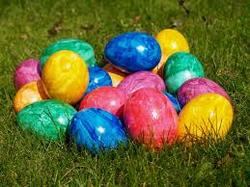 Some of my fondest memories about Easter as a youngster were the Easter Egg hunts. The excitement began before Easter as my sisters and I would dye the Easter Eggs bright colors and decorate them expressing our creativity. Then on Easter Sunday all dressed up in our Easter dresses we would run around the church yard with other excited children, hunting for the brightly colored eggs. These memories bring a smile to my face and now my nieces and nephews are starting to experience that same joy. This year I started to wonder, what do Easter Eggs have to do with Easter? I already knew I would not find Easter Eggs anywhere in the Bible so I did some further research to discover how eggs became associated with Easter and here is what I found: The egg has long been associated with the pagan tradition as a symbol of new life and celebration of spring. Christians have adapted this symbol as one of Jesus’ death and resurrection. The tradition of decorating eggs is believed to have started in the 13th Century. One explanation for this custom of decorating eggs is that eggs were formerly a forbidden food during the Lenten season. Since they were forbidden, towards the end of Lent people would decorate them to mark the end of the period of penance and fasting and then eat them on Easter as part of the celebration. In today’s words, Easter Eggs could have been part of a Lenten practice! This is only one of the many stories of the how eggs became part of the Christian tradition. It is a good reminder that many secular activities in our country have roots to religion and many religions borrow ideas and customs from other traditions. By looking at our history we are better able to understand the meaning behind our actions. Prayer: God of spring, remind us that everything and everyone has a story. Open our hearts, ears, and minds to these stories which are from You. Amen.
0 Comments
Leave a Reply. |
AuthorTina has been approved for ordination pending call through the United Church of Christ. Archives
January 2018
Categories |
Search by typing & pressing enter

 RSS Feed
RSS Feed
